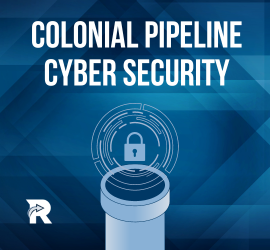
The Colonial Pipeline in South Dakota is one of the most controversial projects to ever come about in cyber security and in environmental affairs. This past May was the two-year anniversary of a devastating ransomware attack against the pipeline.
“The ransomware attack led to a six-day shutdown of the pipeline, prompting gas shortages and an emergency declaration in D.C. and 17 states. The attack brought ransomware to everyday Americans' attention for the first time, inspired Congress to pass new laws, and prompted various federal agencies to institute new cybersecurity requirements.” (Axios).
There are many reasons as to why this cyber-attack occurred, one of them being that regulations just were not in place.
“Ahead of this incident, cybersecurity regulations of oil and gas pipelines were mostly voluntary, whereby owners and operators chose whether to follow the best practice recommendations voiced by the Transportation Security Administration (TSA). Pipeline security had been a persistent concern for some years, but was not sufficiently addressed by existing government oversight.” (World Pipelines).
The difference between the Colonial pipeline attack and other cyber-attacks is the effect on critical infrastructure.
“‘What I've later learned is, I guess, there's a certain amount of attention you get when there's a real impact to human lives,’ Charles Carmakal, senior vice president at cyber firm Mandiant, who helped investigate the Colonial incident, told Axios. ‘But when you impact gas and meat, people really care,’ he added.” (Axios).
Therefore, cyber security of pipelines should be a top concern of cyber security and physical infrastructure professionals. This is still happening and will continue to happen until there is real change in policy and regulation.
“In 2023, two years on from the Colonial Pipeline attack, critical infrastructure is still at risk. In April, a Canadian gas pipeline suffered a security incident that could have caused an explosion at the company’s gas site, according to a New York Times story that cited leaked US intelligence documents. The attackers, from pro-Russia hacking group Zarya, were communicating with Russia’s Federal Security Service (FSB), the primary successor to the KGB, about the incident’s potential for physical damage, according to the leaked documents.” (World Pipelines).
Want to learn more about improving cyber security? Responsive Technology Partners is the leading cyber-security expert in the Athens, Metter, Milledgeville, Vidalia, and Atlanta, Georgia areas. We also have locations in Tampa, Florida, Roanoke, Virginia, and Raleigh, North Carolina. Service offerings include I.T. support, cyber-security and compliance, cloud-based POS systems and support, telephony, cloud services, cabling, access control, and camera systems. Our company’s mission is to provide world-class customer service through industry leading I.T. solutions that make every customer feel as if they are our only customer. Please visit our website to learn more: https://www.responsivetechnologypartners.com/.
Sources:
Axios. https://www.axios.com/2023/05/08/colonial-pipeline-ransomware-attacks-unexpected-legacy
World Pipelines. https://www.worldpipelines.com/special-reports/07052023/colonial-pipeline-attack-2-year-anniversary/




